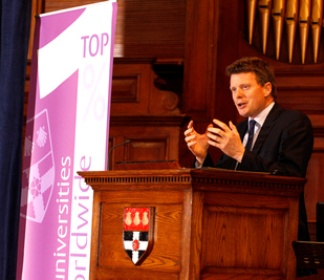Minister contends that human intervention through partnership is the only way to protect countryside
Release Date 03 December 2012

"Human intervention is the only way we are going to protect the countryside we love. The countryside didn't just happen - it was created by humans," Richard Benyon MP, Minister for the Natural Environment and Fisheries, told a packed audience at the Museum of English Rural Life (MERL) Annual Lecture at the University of Reading.
He outlined the importance of the work that the current Government had contributed to the protection of the countryside but recognised the limitations of what Government could do in the future. He called for a joint stewardship of the countryside through a broad partnership of interested parties, including wildlife trusts, conservation groups, research organisations individual charitable donors and importantly, farmers and landowners.
"Any Government is not going to be able to spend any more than it is today on support for farmers. We therefore have to look firstly to farmers and landowners themselves, building on their enthusiasm, their know-how, their knowledge," the Minister said.
Mr Benyon went on to talk passionately on other themes linked to the future of the British countryside, including species protection and the role of culling, as a conservation tool. "Making the decision to control an abundant species because of the damage it is doing to the population of another species is never easy. But if we want a countryside that is rich in wildlife, for our children and our grandchildren to enjoy, we need to start looking seriously at these options now.
Sir David Bell, Vice-Chancellor, University of Reading said: "Richard Benyon's stimulating and thought-provoking lecture raises very important issues that are at the heart of the future of the UK, and indeed the world. Our research at the University in the areas of food security, climate change, planning, sustainability and agriculture, will contribute to our understanding of a sustainable future for the countryside."
Commenting on the role of universities in the area of food security, the Minster said: "How can you make farmers grow more food without causing greater damage to the environment? Of course, it can be achieved, and work done by farmers, and certainly by this great University, show that production can increase alongside an enhanced or protected environment."
Richard Benyon MP was giving the MERL Annual Lecture 2012 at the University of Reading's Museum of English Rural Life.
www.reading.ac.uk/merl
ENDS
For all media enquiries please contact Donna Sibley, University of Reading Press Officer on 0118 378 7388 or by email on d.l.sibley@reading.ac.uk
Follow us on Twitter | Like us on Facebook | Read our research blog 'The Forum'
Notes for editors:
Richard Benyon has been MP for Newbury since May 2005. Before coming to government Mr Benyon served as a Shadow Minister for the Environment, Fisheries and Wildlife. Prior to this appointment he was a Party Whip. He has also served on the Home Affairs Select Committee.
Mr Benyon lives in West Berkshire where he is a farmer. He is a former soldier and is a founder Trustee of the charity Help for Heroes. Mr Benyon is married to Zoe, with whom he has two sons. He also has three sons from his previous marriage.
The Museum of English Rural Life, in Redlands Road, Reading, was founded by the University of Reading in 1951 to reflect and record the changing face of farming and the countryside. It houses designated collections of national importance that span the full range of objects, archives, photographs, film and books. Today, it forms part of the University's Museums and Collections Service. The Museum operates as a major resource and research centre for the history of food, farming and the countryside with links into the School of History and other academic departments at the University.
The University of Reading is ranked among the top 1% of universities in the world (THE World University Rankings 2012) and is one of the UK's top research-intensive universities. The University is ranked in the top 20 for the number of awards it received from research councils for 2010/11.
